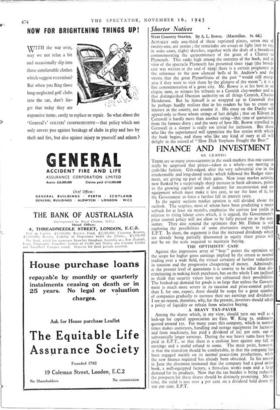FINANCE AND INVESTMENT
Ish GUSTO',
THERE are so many cross-currents in the stock markets that one cannot really be surprised that prices—taken as a whole—are moving in crab-like fashion. Gilt-edged, after the very substantial rise in the irredeemable and long-dated stocks which followed the Budget state- ment, are giving up part of their gains. New issue market activity, now flanked by a surprisingly sharp increase in bank advances, points to the growing capital needs of industry for reconversion and re. equipment which must make it less easy, to say the least of it, for the Government to force a further fall in interest rates.
In the equity sections market opinion is still divided about the
outlook. The sceptics, most of whom have been predicting a major setback for at least six months, emphasise the current low yields in relation to rising labour costs which, it is argued, the Government's price control policy will not allow to be fully passed on to the con- sumer. They also remind the optimists that Mr. Dalton is still exploring the possibilities of some alternative impost to replace E.P.T. In short, the argument is that the increased dividends which are already being partially discounted in equity share prices will not be on the scale required to maintain buying.
THE OPTIMISTS' CASE
Against this impressive array of " bear " points the optimists set
the scope for higher gross earnings implied by the return to normal trading over a wide field, the virtual certainty of further reductions in taxation and the progressive cheapening of money. Admittedly. at the present level of quotations it is unwise to be other than dis- criminating in making fresh purchases, but on the whole I am inclined to think that security values have not exhausted their possibilities. The banked-up demand for goods is so large that unless the Govern- ment is much more severe in its taxation and price-control policy than I, for one, expect, there should be scope for a great number of companies gradually to increase their net earnings and dividends. I see no reason, therefore, why, for the present, investors should adopt a policy of liquidity or refrain from selective buying.
A HEAVY TAX-PAYER
Among the shares which, in my view, should turn out well as a
lock-up for capital appreciation are Geo. W. King 5s. ordinaries quoted around 15s. For many years this company, which in normal times Makes conveyors, handling and storage equipment for factories and farm machinery, has paid a dividend of I21 per cent, out of substantially larger earnings. During the war heavy sums have been paid in E.P.T., so that there is a cushion here against any fall in earnings and a useful refund to come. The main point, however, is that the transition should be comfortable, in that the company has been engaged mainly on its normal peace-time productions, while the new finance required has already been obtained. In his review in June the chairman intimated that the company had a good order book, a well-equipped factory, a first-class works team and a large demand for its products. Now that the tax burden is being reduced, the prospects for these shares should be distinctly promising. Mean- time, the yield is just over 4 per cent. on a dividend held down by too per cent. E.P.T.






























 Previous page
Previous page